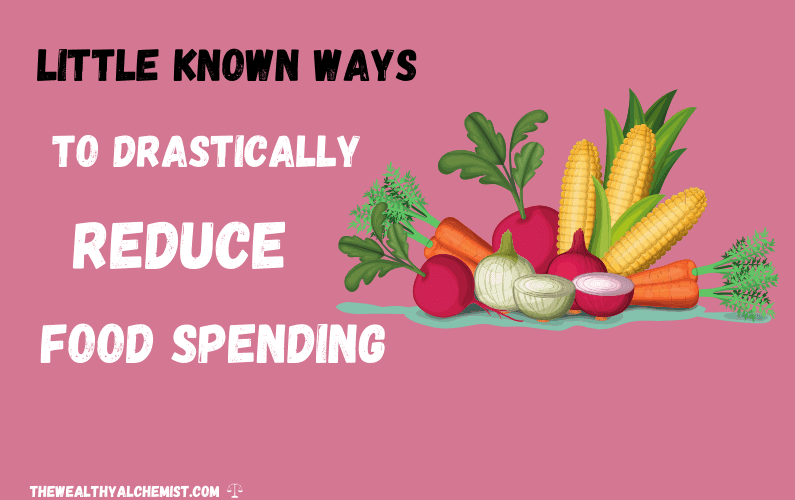
One of the best ways to save money is to find ways to cut your food budget.
What makes me say that? Well, did you know that “Americans spend most of their money on three things: housing, food, and transportation.”
Even without clicking on the link to verify my source, that kind of sounds true, doesn’t it? It’s certainly true for me and, I suspect, it’s true for you as well.
So, if you’re looking to spend less and get your finances in order, you’re not going to cut back on housing or transportation.
No, your best bet is to cut back on your food spending. And that’s what I want to share with you in this post, the most effective ways I’ve found to reduce my food spending.

You may also like: 40 of the Best Cheap Foods to Buy When Broke
Contents
- 1 Food Plans vs. Food Reality
- 1.1 1. Become More Frugal With Food Spending
- 1.2 2. Use Discount Apps to Get Cash Back And Instant Savings
- 1.3 3. Create a Meal Plan to Avoid Last-Minute Purchases
- 1.4 4. Cut Back on Restaurants
- 1.5 5. Make Sure You Create a List Before Hitting the Stores
- 1.6 6. Monitor Your Food Spending
- 1.7 7. Create a Food Budget and Reduce Food Spending
- 1.8 8. Have Your Favorite Meals Delivered to Your Doorstep
- 1.9 9. Don’t Buy it, Make it!
- 1.10 10. Buy Organic Food at a Discount
- 1.11 11. Only Buy What You Need
- 1.12 12. Be Familiar With Your Regular Stores and Their Prices
- 1.13 13. Get Your Food Delivered to Avoid Temptation
- 1.14 14. Recreate Your Leftovers Instead of Throwing Them Out
- 1.15 15. Eat Less Meat to Reduce Food Spending
- 1.16 16. Become Your Own Butcher
Food Plans vs. Food Reality
If yours is like most American households, food spending is one of the main reasons your budget gets blown every month.
And our food spending budget doesn’t seem to get any better either. Because, as every dieter knows, when it comes to food, what we actually eat never matches up with what we planned to eat.
In my case, there are only two people in my household. And personally, it’s really hard to believe that some months we spend over $500 on food (without even going to restaurants!)
That’s nowhere near what my plans were!
I should mention that before, I didn’t even know how much we were spending on food. Not until we started keeping track of our purchases with Personal Capital.
But once we discovered our spending issues, it was only a question of correcting them. Here’s are 16 strategies that we utilized to get our food spending under control.
1. Become More Frugal With Food Spending
My husband and I have adopted a frugal living style, especially when it comes to food. And the truth is that we’re happy with it.
It means that we’ve intentionally tried to become more resourceful and reduce our expenses as much as possible. (If you want to learn more about frugal living ideas, check out our article here.)
So, for example, instead of buying the premium grass-fed beef that we love, we’ll buy the regular beef. And instead of having a three-course dinner, we usually just have a salad with tuna.
Hey, it’s cheap but effective…
By cutting back on all of those food items and finding cheaper alternatives, we were able to save a fortune. Give it a shot yourself, and you’ll be amazed at the savings.
2. Use Discount Apps to Get Cash Back And Instant Savings
There are still quite a few people out there that don’t take advantage of the discounts available on their food purchases. Please don’t be one of them.
If you still haven’t tried them yourself, you should definitely sign up and start saving big on your food spending.
Here are free apps you should sign up for today.
- Rakuten (formerly known as Ebates)
- Top cashback
- Ibotta
You may also like: How to Get a Free Starbucks Drink!
3. Create a Meal Plan to Avoid Last-Minute Purchases
Not creating a meal plan is one of the most common ways to lose control of your food spending. Waiting until the last minute to decide what you’re going to eat increases the chance that you’ll get take out, go to a restaurant, or buy expensive pre-cooked foods.
Creating a meal plan will also help you get organized. And knowing what items you need to buy in advance will help prevent you from overspending.
But if you don’t have the time to go through the process of planning a whole week’s worth of meals, then $5 meal plan will be right down your alley.
$5 Meal Plan creates weekly menus for you that are delicious and affordable, so you can spend your time on things that are truly important.
4. Cut Back on Restaurants
Breaking your habit of eating out is one of the most effective strategies we implemented to cut down on our food spending. It doesn’t mean that we never go out for dinner, but we only do it for really special occasions.
If you’re looking to save some serious dough, this tactic is a great one to start with. But if you’re like us and still want to occasionally eat out, then check for discounts before going. Try Restaurant.com to find available offers before going out.
5. Make Sure You Create a List Before Hitting the Stores
Not having a shopping list before going to the store makes it far more likely that you’re going to buy things you don’t really need.
It’s also more likely that you’ll end up forgetting to get something you really do need and have to end up going back to the store.
Related Post: Creative ways to save money
6. Monitor Your Food Spending
Even if you eat the same thing every week, it’s easy to underestimate just how much you really spend on food.
To keep yourself on track, monitor your food spending at least on a weekly basis.
One way to do this is to save all of your food expenses and create a spreadsheet. But a far easier way to keep track is to use Personal Capital. It’s a free tool and the one that we use to track our own expenses easily.
7. Create a Food Budget and Reduce Food Spending
Even though it’s difficult to stick exactly to a food budget, it’s still a good idea to make one. It gives you something to aim for.
Budgeting our food and using cash for our food purchases helped us our finances in order, and I’m sure that budgeting can help you as well.
If you don’t know how to create a budget, you can check out our article on how to create a budget to succeed financially here.
But if you’re not even sure you need a budget, you can read here why budgeting is for everyone. Once you’re ready to start budgeting, you can choose the budgeting method that works best for you.
8. Have Your Favorite Meals Delivered to Your Doorstep
How can meal delivery cut down your food spending you ask?
Well, imagine this. You leave the office after a hard day’s work and go by the store to pick up some dinner.
You’re hungry, you’re tired and you have no clue what you’re going to make. It’s the perfect storm…and you end up spending a whole lot more than you ever thought you would.
Do that a few nights a week and you can kiss your budget good-bye! But what if you didn’t have to drag yourself to the store after work, or wrack your brains trying to figure out what to make.
Well, you don’t! Because Home Chef will do all the dragging and wracking for you!
Home Chef is a home delivery service that provides you with all the fresh ingredients you need to create a delicious meal in no time. Once you sign up and create an account, you can choose your preferences from their weekly menu.
Sign up here and create your account to start getting your favorites meals delivered to your house today!
9. Don’t Buy it, Make it!

We all have things we eat on a regular basis. Staples, such as bread, milk, etc. that you get on at least a weekly basis.
If you do a few quick calculations, you’ll see that those staples cost a pretty penny and that it may be a whole lot cheaper to just make it yourself.
We realized that making our favorite items at home was one of the best ways to save money. And at the same time, it’s a lot of fun and it tastes much better too.
Here are some of the things that you can make for yourself at home to save money.
FYI: Did you know that Millenials are spending more on coffee than on their retirement plans? It’s true. And if that sounds like you then you definitely ought to skip Starbucks and start preparing your coffee at home.
10. Buy Organic Food at a Discount
Adopting a healthy lifestyle usually involves shopping organically. But you may have noticed that organic food usually comes with price tags that can literally take your breath away.
Not everyone’s budget can handle an all-organic diet, but there are stores out there, such as VitaCost and Thrive Market, that provide competitive prices for good organic food.
11. Only Buy What You Need
One thing I had to learn was not to buy things just because they’re on sale. I mean, if you don’t need it, then it’s a waste of money no matter how much of a discount they’re giving you.
Stick to your grocery list and focus just on what you need. Close your eyes as you walk by the cookies if you have to!
You may also like: Grocery Spending: 25+ Ways to Reduce It!
12. Be Familiar With Your Regular Stores and Their Prices
Don’t go to just one store to do all of your shopping. That’s a sure way to spend more than you need to.
Instead, we recommend that you become familiar with your local stores and compare product prices. That way you can learn who has the best deals.
13. Get Your Food Delivered to Avoid Temptation
14. Recreate Your Leftovers Instead of Throwing Them Out
Revamp your leftovers into new meals to reduce waste and save you money.
Depending on what you’ve got in the fridge, you can recreate it by:
- Stuffing it in a bell pepper
- Mixing it into an omelet
- Turning it into soup
- Mixing it with Rice
- Turning it into a wrap or burrito
15. Eat Less Meat to Reduce Food Spending
“New research suggests vegetarians can save at least $750 more than meat-eaters per year.”
Now, I’m not recommending that anyone become a vegetarian, but I have noticed that my food spending is a lot lower when I don’t need to buy meat.
But if you can’t go without meat even for a short time, cutting out red meats only can have a dramatic impact on your expenses.
Buying tuna and chicken may be a good option if you need to save a few bucks. It’s something that we’ve done and it’s given us good results.
16. Become Your Own Butcher
One way to cut your food budget when it comes to meat is to buy whole pieces of meat. The reason is that you normally pay for someone to cut up the meat, so buying meat you have to cut yourself will make it cheaper.
Also meats with bones should be cheaper than fillets.
With these different strategies, you should definitely see some improvement in your food expense.
Let us know how you’ve managed to get your spending under control in the comments below!
Cheers!

You may also like: Creative ways to save money
Idalmis
Latest posts by Idalmis (see all)
- Why Is Budgeting Important? 12 Best Reasons to Start Budgeting Today! - October 6, 2020
- How to be Frugal With Groceries. Must Try Tips! - September 15, 2020
- Is Skillshare Worth It? Best 2020 Review - August 31, 2020



